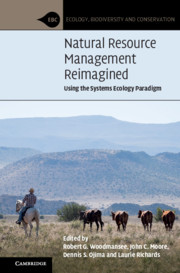
-
Select format
-
- Publisher:
- Cambridge University Press
- Publication date:
- February 2021
- March 2021
- ISBN:
- 9781108655354
- 9781108497558
- 9781108740135
- Dimensions:
- (228 x 152 mm)
- Weight & Pages:
- 0.86kg, 460 Pages
- Dimensions:
- (228 x 152 mm)
- Weight & Pages:
- 0.76kg, 460 Pages
You may already have access via personal or institutional login
Book description
The Systems Ecology Paradigm (SEP) incorporates humans as integral parts of ecosystems and emphasizes issues that have significant societal relevance such as grazing land, forestland, and agricultural ecosystem management, biodiversity and global change impacts. Accomplishing this societally relevant research requires cutting-edge basic and applied research. This book focuses on environmental and natural resource challenges confronting local to global societies for which the SEP methodology must be utilized for resolution. Key elements of SEP are a holistic perspective of ecological/social systems, systems thinking, and the ecosystem approach applied to real world, complex environmental and natural resource problems. The SEP and ecosystem approaches force scientific emphasis to be placed on collaborations with social scientists and behavioral, learning, and marketing professionals. The SEP has given environmental scientists, decision makers, citizen stakeholders, and land and water managers a powerful set of tools to analyse, integrate knowledge, and propose adoption of solutions to important local to global problems.
Reviews
‘Natural Resource Management Reimagined is … a welcome addition to my personal library and it is highly recommended for institutional libraries.’
Peter F. Scogings Source: African Journal of Range and Forage Science
Contents
Metrics
Altmetric attention score
Full text views
Full text views help Loading metrics...
Loading metrics...
* Views captured on Cambridge Core between #date#. This data will be updated every 24 hours.
Usage data cannot currently be displayed.
Accessibility standard: Unknown
Why this information is here
This section outlines the accessibility features of this content - including support for screen readers, full keyboard navigation and high-contrast display options. This may not be relevant for you.
Accessibility Information
Accessibility compliance for the PDF of this book is currently unknown and may be updated in the future.


